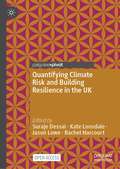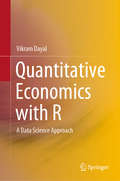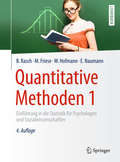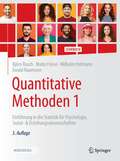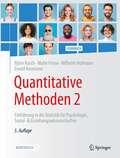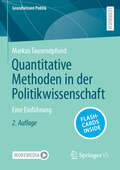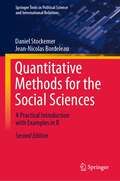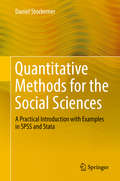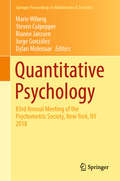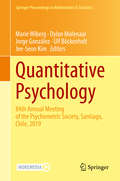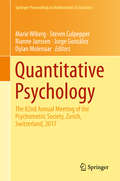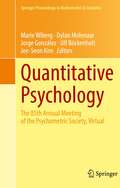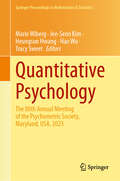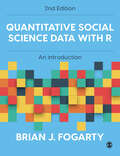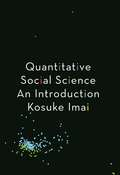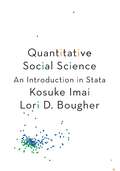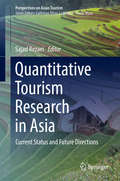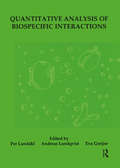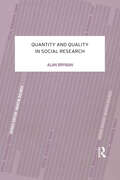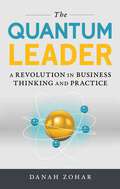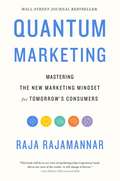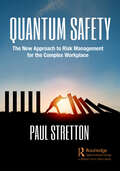- Table View
- List View
Quantifying Climate Risk and Building Resilience in the UK
by Jason Lowe Suraje Dessai Kate Lonsdale Rachel HarcourtThis open access book draws together key research from the UK Climate Resilience programme. It focuses on topics central to the programme’s research agenda, including improved characterisation and quantification of climate risks, enhanced understanding of the management of climate risks, and the development and delivery of climate services. Key chapters address the challenges inherent to undertaking resilience research, including how to make the term ‘climate resilience’ usable and useful, co-producing research between academics, policy makers and practitioners, and engaging and communicating outside of academia. This book is unique in providing a concise and accessible overview of the programme’s key lessons, placing the findings into a wider context and it will inform future research, policy and practice agendas.
Quantitative Economics with R: A Data Science Approach
by Vikram DayalThis book provides a contemporary treatment of quantitative economics, with a focus on data science. The book introduces the reader to R and RStudio, and uses expert Hadley Wickham’s tidyverse package for different parts of the data analysis workflow. After a gentle introduction to R code, the reader’s R skills are gradually honed, with the help of “your turn” exercises. At the heart of data science is data, and the book equips the reader to import and wrangle data, (including network data). Very early on, the reader will begin using the popular ggplot2 package for visualizing data, even making basic maps. The use of R in understanding functions, simulating difference equations, and carrying out matrix operations is also covered. The book uses Monte Carlo simulation to understand probability and statistical inference, and the bootstrap is introduced. Causal inference is illuminated using simulation, data graphs, and R code for applications with real economic examples, covering experiments, matching, regression discontinuity, difference-in-difference, and instrumental variables. The interplay of growth related data and models is presented, before the book introduces the reader to time series data analysis with graphs, simulation, and examples. Lastly, two computationally intensive methods—generalized additive models and random forests (an important and versatile machine learning method)—are introduced intuitively with applications. The book will be of great interest to economists—students, teachers, and researchers alike—who want to learn R. It will help economics students gain an intuitive appreciation of applied economics and enjoy engaging with the material actively, while also equipping them with key data science skills.
Quantitative Methoden 1: Einführung in die Statistik für Psychologen und Sozialwissenschaftler (Springer-Lehrbuch)
by Wilhelm Hofmann Björn Rasch Malte Friese Ewald NaumannWelche Angst plagt die meisten Studienanfänger im Psychologie-Studium? Die Angst vor der Statistik-Prüfung! Hier schaffen wir Abhilfe, denn die Statistik ist ein wichtiges Handwerkszeug, um zu verstehen, wie die Psychologie Erkenntnisse gewinnt und ihre Forschungsergebnisse zu bewerten sind – und wenn die Statistik verständlich erklärt ist, gibt es keinen Grund zur Panik! Mit den beiden Bänden Quantitative Methoden 1/2 meistern Sie die Grundlagen der Statistik! Anwendungsbezogen und verständlich werden hier die Inhalte der Vorlesungen Quantitative Methoden, Statistik oder Methodenlehre erklärt. Band 1 umfasst die Themen deskriptive Statistik, Grundzüge der Inferenzstatistik und den t-Test sowie Zusammenhangsmaße und Regression. Mit Verständnisfragen und Antworten, Glossar der wichtigsten Statistik-Begriffe und Verteilungstabellen. – Außerdem mit vielen kostenlosen Zusatzmaterialien auf der begleitenden Lehrbuch-Website: Mehrere hundert Extraseiten mit Anleitungen zur konkreten Durchführung der behandelten statistischen Verfahren mit SPSS und R, Informationen zur Durchführung von Teststärkeanalysen und Stichprobenumfangsplanungen mit G*Power sowie Beispielaufgaben – alles inklusive notwendiger Datensätze. Und ganz NEU in der 4. Auflage: Zahlreiche Erklärungsvideos zu wichtigen Formeln und Zusammenhängen!
Quantitative Methoden 1: Einführung in die Statistik für Psychologie, Sozial- & Erziehungswissenschaften
by Wilhelm Hofmann Björn Rasch Malte Friese Ewald NaumannDieses Lehrbuch macht Dich fit für die Statistik-Prüfung – hier geht es um die Deskriptive Statistik sowie um die ersten Schritte in Inferenzstatistik, z.B. den t-Test. Also Dinge, die in vielen sozialwissenschaftlichen Studiengängen, wie z.B. Psychologie, Soziologie oder Erziehungswissenschaften, auf dem Lehrplan stehen. Vielen macht die Statistik Angst – aber mit diesem Buch wirst Du die Prüfung meistern, weil Dir hier alles sehr verständlich und ergänzt durch kostenfreie Videos und umfangreiche zusätzliche Materialien erklärt wird.
Quantitative Methoden 2: Einführung in die Statistik für Psychologie, Sozial- & Erziehungswissenschaften
by Wilhelm Hofmann Björn Rasch Malte Friese Ewald NaumannDieses Lehrbuch macht Dich fit für die Statistik-Prüfung – hier geht es u.a. um Varianzanalysen und Verfahren für Rang- und Nominaldaten. Also Dinge, die in vielen sozialwissenschaftlichen Studiengängen, wie z.B. Psychologie, Soziologie oder Erziehungswissenschaften, auf dem Lehrplan stehen. Mit diesem Buch wirst Du die Prüfung meistern, weil Dir hier alles sehr verständlich und ergänzt durch kostenfreie Videos und umfangreiche zusätzliche Materialien erklärt wird.
Quantitative Methoden in der Politikwissenschaft: Eine Einführung (Grundwissen Politik)
by Markus TausendpfundDieses Lehrbuch bietet eine Einführung in die sozialwissenschaftliche Forschungslogik und den quantitativen Forschungsprozess. Die einzelnen Phasen des Forschungsprozesses – Forschungsthema und Entwicklung einer Forschungsfrage, Konzeptspezifikation, Hypothesenbildung, Operationalisierung, Forschungsdesign, Auswahlverfahren und Datenerhebung – werden anhand politikwissenschaftlicher Beispiele dargestellt und erläutert. Zudem werden wichtige sozialwissenschaftliche Datensätze vorgestellt und die Bedeutung der Sekundäranalyse herausgearbeitet. Es bietet damit zentrale Informationen, die für ein Verständnis der quantitativen Sozialforschung und die Auseinandersetzung mit empirischen Studien erforderlich sind. Für die 2. Auflage wurde das Buch aktualisiert und überarbeitet.
Quantitative Methods for the Social Sciences: A Practical Introduction with Examples in R (Springer Texts in Political Science and International Relations)
by Daniel Stockemer Jean-Nicolas BordeleauThis textbook offers an essential introduction to survey research and quantitative methods with clear instructions on how to conduct statistical tests with R. Building on the premise that we need to teach statistical methods in a holistic and practical format, the book guides students through the four main elements of survey research and quantitative analysis: (1) the importance of survey research, (2) preparing a survey, (3) conducting a survey and (4) analyzing a survey. In detail, students will learn how to create their own questionnaire on the basis of formulating hypotheses; sampling participants; disseminating their questionnaire; creating datasets; and analyzing their data. The data analytical sections of this revised and extended edition explain the theory, rationale and mathematical foundations of relevant bivariate and multi-variate statistical tests. These include the T-test, F-test, Chi-square test and correlation analyses, as well as bivariate and multivariate regression analyses. In addition, the book offers a brief introduction to statistical computing with R, which includes clear instructions on how to conduct these statistical tests in R. Given the breadth of its coverage, the textbook is suitable for introductory statistics, survey research and quantitative methods classes in the social sciences.
Quantitative Methods for the Social Sciences: A Practical Introduction with Examples in SPSS and Stata
by Daniel StockemerThis textbook offers an essential introduction to survey research and quantitative methods. Building on the premise that statistical methods need to be learned in a practical fashion, the book guides students through the various steps of the survey research process and helps to apply those steps toward a real example. In detail, the textbook introduces students to the four pillars of survey research and quantitative analysis: (1) the importance of survey research, (2) preparing a survey, (3) conducting a survey and (4) analyzing a survey. Students are shown how to create their own questionnaire based on some theoretically derived hypotheses to achieve empirical findings for a solid dataset. Lastly, they use said data to test their hypotheses in a bivariate and multivariate realm. The book explains the theory, rationale and mathematical foundations of these tests. In addition, it provides clear instructions on how to conduct the tests in SPSS and Stata. Given the breadth of its coverage, the textbook is suitable for introductory statistics, survey research or quantitative methods classes in the social sciences.
Quantitative Psychology: 83rd Annual Meeting of the Psychometric Society, New York, NY 2018 (Springer Proceedings in Mathematics & Statistics #265)
by Marie Wiberg Jorge González Steven Culpepper Rianne Janssen Dylan MolenaarThis proceedings volume highlights the latest research and developments in psychometrics and statistics. This book compiles and expands on selected and peer reviewed presentations given at the 83rd Annual International Meeting of the Psychometric Society (IMPS), organized by Columbia University and held in New York, USA July 9th to 13th, 2018.The IMPS is one of the largest international meetings on quantitative measurement in education, psychology and the social sciences. The last couple of years it has attracted more than 500 participants and more than 250 paper presentations from researchers around the world.Leading experts in the world and promising young researchers have written the 38 chapters. The chapters address a large variety of topics including but not limited to item response theory, multistage adaptive testing, and cognitive diagnostic models. This volume is the 7th in a series of recent volumes to cover research presented at the IMPS.
Quantitative Psychology: 84th Annual Meeting of the Psychometric Society, Santiago, Chile, 2019 (Springer Proceedings in Mathematics & Statistics #322)
by Marie Wiberg Jorge González Dylan Molenaar Ulf Böckenholt Jee-Seon KimThis proceedings volume highlights the latest research and developments in psychometrics and statistics. It represents selected and peer reviewed presentations given at the 84th Annual International Meeting of the Psychometric Society (IMPS), organized by Pontificia Universidad Católica de Chile and held in Santiago, Chile during July 15th to 19th, 2019.The IMPS is one of the largest international meetings on quantitative measurement in education, psychology and the social sciences. It draws approximately 500 participants from around the world, featuring paper and poster presentations, symposiums, workshops, keynotes, and invited presentations.Leading experts and promising young researchers have written the included chapters. The chapters address a large variety of topics including but not limited to item response theory, multistage adaptive testing, and cognitive diagnostic models. This volume is the 8th in a series of recent volumes to cover research presented at the IMPS.
Quantitative Psychology: The 81st Annual Meeting Of The Psychometric Society, Asheville, North Carolina 2016 (Springer Proceedings in Mathematics & Statistics #196)
by Marie Wiberg Jorge González Steven Culpepper Rianne Janssen Dylan MolenaarThis proceedings book highlights the latest research and developments in psychometrics and statistics. Featuring contributions presented at the 82nd Annual Meeting of the Psychometric Society (IMPS), organized by the University of Zurich and held in Zurich, Switzerland from July 17 to 21, 2017, its 34 chapters address a diverse range of psychometric topics including item response theory, factor analysis, causal inference, Bayesian statistics, test equating, cognitive diagnostic models and multistage adaptive testing. The IMPS is one of the largest international meetings on quantitative measurement in psychology, education and the social sciences, attracting over 500 participants and 250 paper presentations from around the world every year. This book gathers the contributions of selected presenters, which were subsequently expanded and peer-reviewed.
Quantitative Psychology: The 85th Annual Meeting of the Psychometric Society, Virtual (Springer Proceedings in Mathematics & Statistics #353)
by Marie Wiberg Jorge González Dylan Molenaar Ulf Böckenholt Jee-Seon KimThis proceedings volume highlights the latest research and developments in psychometrics and statistics. It represents selected and peer-reviewed presentations given at the 85th Annual International Meeting of the Psychometric Society (IMPS), held virtually on July 13-17, 2020. The IMPS is one of the largest international meetings on quantitative measurement in education, psychology and the social sciences. It draws approximately 500 participants from around the world, featuring paper and poster presentations, symposiums, workshops, keynotes, and invited presentations. Leading experts and promising young researchers have written the included chapters. The chapters address a wide variety of topics including but not limited to item response theory, adaptive testing, Bayesian estimation, propensity scores, and cognitive diagnostic models. This volume is the 9th in a series of recent works to cover research presented at the IMPS.
Quantitative Psychology: The 88th Annual Meeting of the Psychometric Society, Maryland, USA, 2023 (Springer Proceedings in Mathematics & Statistics #452)
by Marie Wiberg Jee-Seon KimThis book includes presentations given at the 88th annual meeting of the Psychometric Society, held in Maryland, USA on July 24–28, 2023. The proceeding covers a diverse set of psychometric topics. The topics include, but are not limited to item response theory, cognitive diagnostic models, Bayesian estimation, validity and reliability issues, and several applications within different fields. The authors are from all over the world, they work in different psychometrics areas, as well as having diverse professional and academic experiences.
Quantitative Social Science Data with R: An Introduction
by Brian J FogartyRelevant, engaging, and packed with student-focused learning features, this book provides the basic step-by-step introduction to quantitative research and data every student needs. Gradually introducing applied statistics and the language and functionality of R and R Studio software, it uses examples from across the social sciences to show students how to apply abstract statistical and methodological principles to their own work. Maintaining a student-friendly pace, it goes beyond a normal introductory statistics book and shows students where data originates and how to: - Understand and use quantitative data to answer questions - Approach surrounding ethical issues - Collect quantitative data - Manage, write about, and share the data effectively Supported by incredible digital resources with online tutorials, videos, datasets, and multiple choice questions, this book gives students not only the tools they need to understand statistics, quantitative data, and R software, but also the chance to practice and apply what they have learned.
Quantitative Social Science Data with R: An Introduction
by Brian J FogartyRelevant, engaging, and packed with student-focused learning features, this book provides the basic step-by-step introduction to quantitative research and data every student needs. Gradually introducing applied statistics and the language and functionality of R and R Studio software, it uses examples from across the social sciences to show students how to apply abstract statistical and methodological principles to their own work. Maintaining a student-friendly pace, it goes beyond a normal introductory statistics book and shows students where data originates and how to: - Understand and use quantitative data to answer questions - Approach surrounding ethical issues - Collect quantitative data - Manage, write about, and share the data effectively Supported by incredible digital resources with online tutorials, videos, datasets, and multiple choice questions, this book gives students not only the tools they need to understand statistics, quantitative data, and R software, but also the chance to practice and apply what they have learned.
Quantitative Social Science: An Introduction
by Kosuke ImaiAn introductory textbook on data analysis and statistics written especially for students in the social sciences and allied fieldsQuantitative analysis is an increasingly essential skill for social science research, yet students in the social sciences and related areas typically receive little training in it—or if they do, they usually end up in statistics classes that offer few insights into their field. This textbook is a practical introduction to data analysis and statistics written especially for undergraduates and beginning graduate students in the social sciences and allied fields, such as economics, sociology, public policy, and data science.Quantitative Social Science engages directly with empirical analysis, showing students how to analyze data using the R programming language and to interpret the results—it encourages hands-on learning, not paper-and-pencil statistics. More than forty data sets taken directly from leading quantitative social science research illustrate how data analysis can be used to answer important questions about society and human behavior.Proven in the classroom, this one-of-a-kind textbook features numerous additional data analysis exercises and interactive R programming exercises, and also comes with supplementary teaching materials for instructors.Written especially for students in the social sciences and allied fields, including economics, sociology, public policy, and data scienceProvides hands-on instruction using R programming, not paper-and-pencil statisticsIncludes more than forty data sets from actual research for students to test their skills onCovers data analysis concepts such as causality, measurement, and prediction, as well as probability and statistical toolsFeatures a wealth of supplementary exercises, including additional data analysis exercises and interactive programming exercisesOffers a solid foundation for further studyComes with additional course materials online, including notes, sample code, exercises and problem sets with solutions, and lecture slidesLooking for a more accessible introduction? Consider Data Analysis for Social Science by Elena Llaudet and Kosuke Imai, which teaches from scratch and step-by-step the fundamentals of survey research, predictive models, and causal inference. It covers descriptive statistics, the difference-in-means estimator, simple linear regression, and multiple linear regression.
Quantitative Social Science: An Introduction in Stata
by Kosuke Imai Lori D. BougherThe Stata edition of the groundbreaking textbook on data analysis and statistics for the social sciences and allied fieldsQuantitative analysis is an increasingly essential skill for social science research, yet students in the social sciences and related areas typically receive little training in it—or if they do, they usually end up in statistics classes that offer few insights into their field. This textbook is a practical introduction to data analysis and statistics written especially for undergraduates and beginning graduate students in the social sciences and allied fields, such as business, economics, education, political science, psychology, sociology, public policy, and data science.Quantitative Social Science engages directly with empirical analysis, showing students how to analyze data using the Stata statistical software and interpret the results—it emphasizes hands-on learning, not paper-and-pencil statistics. More than fifty data sets taken directly from leading quantitative social science research illustrate how data analysis can be used to answer important questions about society and human behavior.Proven in classrooms around the world, this one-of-a-kind textbook features numerous additional data analysis exercises, and also comes with supplementary teaching materials for instructors.Written especially for students in the social sciences and allied fields, including business, economics, education, psychology, political science, sociology, public policy, and data scienceProvides hands-on instruction using Stata, not paper-and-pencil statisticsIncludes more than fifty data sets from actual research for students to test their skills onCovers data analysis concepts such as causality, measurement, and prediction, as well as probability and statistical toolsFeatures a wealth of supplementary exercises, including additional data analysis exercises and interactive programming exercisesOffers a solid foundation for further studyComes with additional course materials online, including notes, sample code, exercises and problem sets with solutions, and lecture slides
Quantitative Tourism Research in Asia: Current Status And Future Directions (Perspectives on Asian Tourism)
by Sajad RezaeiThe purpose of this book is twofold. First, this book is an attempt to map the state of quantitative research in Asian tourism and hospitality context and provide a detailed description of the design, implementation, application, and challenges of quantitative methods in tourism in Asia. Second, this book aims to contribute to the tourism literature by discussing the past, current and future quantitative data analysis methods.The book offers new insights into well-established research techniques such as regression analysis, but goes beyond first generation data analysis techniques to introduce methods seldom – if ever – used in tourism and hospitality research. In addition to investigating existing and novel research techniques, the book suggests areas for future studies. In order to achieve its objectives the analysis is split into three main sections: understanding the tourism industry in Asia; the current status of quantitative data analysis; and future directions for Asian tourism research.
Quantitive Analysis Of Biospec
by Per Lundahl; Andreas Lundqvist; Eva GreijerFirst published in 2004, this book collects several up-to-date methods for quantitative analysis of biospecific interactions, a field that has a long history that perhaps can be said to have begun with the classical paper of G. Scatchard in 1949 (The attractions of proteins for small molecules and ions, but which has advanced impressively during the last few years. A precise spatial arrangement of just a few hydrogen bonds can confer a remarkably specific reversible association between two molecules. A web of weak interactions governs biospecific recognition in general. The binding equilibria in living cells tune and coordinate a multitude of functions. The thermodynamic properties of such interactions are often studied by binding experiments in simplified and essentially ideal systems. However, similar types of studies may elucidate the biologically relevant dynamic steady-state conditions in living cells and organisms, allowing for the very wide range of interactant concentrations and the interplay between the many reactions and interactions. The development in biosciences will continue with in-depth studies of macromolecules and membranes. More detailed knowledge will allow analyses of delicate balances between substances and events in the complex systems involved in life processes. Methods to study biospecific affinities are thus highly important tools for understanding mechanisms and effects of molecular binding events in vivo and in vitro, e.g., in biochemical, biomedical and pharmaceutical research, and for biotechnological research and production.
Quantity and Quality in Social Research
by Alan BrymanFirst published in 1988. Routledge is an imprint of Taylor & Francis, an informa company.
Quantum Cryptography: From Key Distribution to Conference Key Agreement (Quantum Science and Technology)
by Federico GrasselliRising concerns about the security of our data have made quantum cryptography a very active research field in recent years. Quantum cryptographic protocols promise everlasting security by exploiting distinctive quantum properties of nature. The most extensively implemented protocol is quantum key distribution (QKD), which enables secure communication between two users. The aim of this book is to introduce the reader to state-of-the-art QKD and illustrate its recent multi-user generalization: quantum conference key agreement. With its pedagogical approach that doesn’t disdain going into details, the book enables the reader to join in cutting-edge research on quantum cryptography.
Quantum Leader: A Revolution in Business Thinking and Practice
by Danah ZoharDrawing inspiration from quantum physics, innovative management thinker Danah Zohar offers a powerful new model for business thinking and practice. "Quantum leaders," she says, like the systems they have to manage, are poised at "the edge of chaos." They thrive on the potential latent in uncertainty and are adept at unleashing the creativity of self-organization. More important, they are vision- and value-led; they adapt quickly, are unafraid to play with the boundaries and reinvent the rules, and celebrate diversity. Zohar points out that the existing, business-as-usual paradigm owes a great deal to the outdated thinking, assumptions, and values of Newtonian science, which gave rise to the Industrial Revolution. Newtonian thinking assumes that corporations and markets are like machines--predictable, stable, and controllable; they are best managed in a way that eliminates risk and assures equilibrium. Unfortunately, as the global financial collapse of 2008 demonstrated, this way of thinking is as obsolete as the steam engine. Further developing ideas she introduced in her acclaimed Rewiring the Corporate Brain and Spiritual Capital, Zohar has written an inspirational book that will motivate leaders to tap the full potential of their employees, their businesses, and the customers they serve.
Quantum Marketing: Mastering the New Marketing Mindset for Tomorrow's Consumers
by Raja RajamannarRaja Rajamannar, Chief Marketing Officer of Mastercard, shares breakthrough, frontier strategies to navigate the challenges marketers face to thrive in a modern business world that is changing with unprecedented speed and disruption.As technology has continually evolved in the last several decades, marketing has had to change with it, evolving through four significant stages that build on the strategies and tools of the previous era. What happens next in the fifth stage, or Fifth Paradigm, will not be an evolution, but a revolution. Almost everything about how marketing is done today, including the very notion of a brand itself, will require a complete re-imagination.As Chief Marketing Officer of Mastercard—one of the world&’s most recognizable and decorated brands—Raja Rajamannar shares the forward-thinking ways all businesses must rethink their entire marketing landscape to remain relevant and be successful.Readers will:Understand the evolution of marketing and how to be at the forefront of future change.Get clarity on the right marketing strategies and tactics to pursue amidst an ever-evolving industry.Achieve breakthroughs in innovative thinking in order to compete in modern business.Gain perspective from top marketers across industries. Quantum Marketing is for all business people who seek to understand how rapidly marketing is evolving, what some of the smartest people in the discipline are doing to get ready for this dramatic shift, and what the new world will look like for companies, consumers, and society at large as the race to develop revolutionary marketing strategies reaches a whole new level.
Quantum Safety: The New Approach to Risk Management for the Complex Workplace
by Paul StrettonThis book is the most comprehensive review of health and safety in half a century. Most organisational approaches to health and safety are based on the methodology developed during the 1970s, and despite the workplace changing beyond recognition since that time, these approaches have remained untouched. Quantum Safety will develop a new understanding fit for the modern workplace. Quantum Safety is an approach that is part of the "new view" debate. There have been a number of other new approaches to health and safety in recent years, and while they all have merit and improve understanding to help create the optimal, safe working environment, they have failed to significantly create the change desired. These approaches are often flawed at the philosophical or conceptual level or propose a solution without a pathway to implement the principles in safety-critical environments. Quantum Safety: The New Approach to Risk Management for the Complex Workplace is founded on a wholesale critical analysis of the conceptual foundations of health and safety before translating the revised principles into a tangible methodology. Central to the development of Quantum Safety is the application of Complexity Science. The traditional approach to health and safety is considered to be Newtonian – it uses linear models and deterministic analysis. Quantum Safety, due to the full consideration of Complexity Science, introduces multidimensional models and develops analysis based on probabilities. Crucially, this does not render Newtonian methodologies as worthless – in the same manner that Newtonian physics was able to take mankind to the moon, but required the quantum understanding within computers to make it possible – Quantum Safety provides the mechanisms to complete organisations’ safety-based journeys. The new mechanisms are fully developed for the reader at both macro and micro levels. How an organisation measures safety and what it values are reset and re-examined. How we investigate adverse events and the consequential actions taken with employees to develop a true Just Culture within a high-performing culture are also completely revised. Essentially, Quantum Safety creates a pathway for understanding health and safety in the complex modern world. To achieve that, new models are introduced to replace the dated, simple tools and a new language is developed to communicate this powerful approach. It will help propel an organisation from considering safety within a concept of industrialised failure avoidance to valuing safety as an integrated aspect of high performance.
Quantum Safety: The New Approach to Risk Management for the Complex Workplace
by Paul StrettonThis book is the most comprehensive review of health and safety in half a century. Most organisational approaches to health and safety are based on the methodology developed during the 1970s, and despite the workplace changing beyond recognition since that time, these approaches have remained untouched. Quantum Safety will develop a new understanding fit for the modern workplace. Quantum Safety is an approach that is part of the "new view" debate. There have been a number of other new approaches to health and safety in recent years, and while they all have merit and improve understanding to help create the optimal, safe working environment, they have failed to significantly create the change desired. These approaches are often flawed at the philosophical or conceptual level or propose a solution without a pathway to implement the principles in safety-critical environments. Quantum Safety: The New Approach to Risk Management for the Complex Workplace is founded on a wholesale critical analysis of the conceptual foundations of health and safety before translating the revised principles into a tangible methodology. Central to the development of Quantum Safety is the application of Complexity Science. The traditional approach to health and safety is considered to be Newtonian – it uses linear models and deterministic analysis. Quantum Safety, due to the full consideration of Complexity Science, introduces multidimensional models and develops analysis based on probabilities. Crucially, this does not render Newtonian methodologies as worthless – in the same manner that Newtonian physics was able to take mankind to the moon, but required the quantum understanding within computers to make it possible – Quantum Safety provides the mechanisms to complete organisations’ safety-based journeys. The new mechanisms are fully developed for the reader at both macro and micro levels. How an organisation measures safety and what it values are reset and re-examined. How we investigate adverse events and the consequential actions taken with employees to develop a true Just Culture within a high-performing culture are also completely revised. Essentially, Quantum Safety creates a pathway for understanding health and safety in the complex modern world. To achieve that, new models are introduced to replace the dated, simple tools and a new language is developed to communicate this powerful approach. It will help propel an organisation from considering safety within a concept of industrialised failure avoidance to valuing safety as an integrated aspect of high performance.
